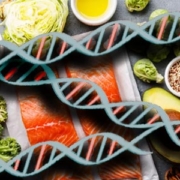Better Health with Nutritional Testing
Nutritional Testing: Is Your Diet Making You Sick?
You’ve probably heard the old saying many times, “You are what you eat”. Well, advanced medical science has now proven that this is indeed very true! Functional medicine specialist Dr. Ruthie Harper in Austin, TX, can help you understand your nutritional status, in order to achieve optimal health and vitality, with advanced nutritional testing.
State-of-the-art nutritional testing at Dr. Ruthie Harper, MD in Austin, TX can help you identify the nutritional deficiencies and imbalances that are affecting your overall health and keeping you from feeling your best. In this article top Austin functional medicine doctor Ruthie Harper, MD explains the various types of nutritional tests and what they can reveal about your health and well-being.
Micronutrient Testing
Micronutrient testing is a comprehensive assessment that measures the levels of essential vitamins, minerals, antioxidants, and other nutrients in the body. Unlike standard blood tests, which often only measure deficiencies in a few nutrients, micronutrient testing provides a detailed analysis of more than thirty different nutritional components that are crucial for maintaining overall health.
Deficiencies in micronutrients can be caused by various factors, including poor dietary intake, chronic illnesses, medication use, and absorption issues. Individuals can suffer from micronutrient deficiencies due to poor eating habits, eating a lot of processed or fast food, restrictive diets (such as vegans), food allergies or sensitivities, gastrointestinal disorders like Crohn’s disease or celiac disease, and chronic conditions such as diabetes. Athletes and individuals with high physical demands may also be at risk due to increased nutrient needs.
Micronutrient testing is typically conducted through a blood test, where both serum and intracellular levels of nutrients are measured. This dual approach provides a more accurate picture of an individual’s nutritional status, as serum levels can fluctuate more readily than intracellular levels. The test can reveal deficiencies that may not be apparent through symptoms alone, allowing for early intervention and prevention of potential health issues.
The benefits of micronutrient testing are well-documented in various studies. According to the American Journal of Clinical Nutrition, targeted nutritional interventions based on detailed testing can improve health outcomes significantly. Another study published in the Journal of the American College of Nutrition highlighted that addressing micronutrient deficiencies can enhance immune function, reduce the risk of chronic diseases, and improve cognitive and physical performance.
Nutritional Testing for Deficiencies
Nutritional deficiencies can lead to a wide range of health problems, from fatigue and cognitive impairments to chronic diseases. Identifying and addressing these deficiencies through targeted nutritional testing allows for personalized treatment plans that can significantly improve health outcomes. Dr. Ruthie Harper offers comprehensive nutritional testing to help patients understand their unique needs and optimize their health.
Vitamin D Nutritional Testing
Vitamin D deficiency is prevalent, particularly in individuals with limited sun exposure, darker skin tones, or those who use sunscreen regularly. It can lead to issues such as weakened bones, immune dysfunction, and increased risk of chronic diseases. Testing for vitamin D levels typically involves a blood test measuring 25-hydroxyvitamin D. Treatment for deficiency includes supplementation and increased sun exposure, aiming to maintain levels within the optimal range.
MCV Nutritional Testing
Mean Corpuscular Volume (MCV) measures the average size of red blood cells and can indicate nutritional deficiencies such as vitamin B12 or folate deficiency. Individuals at risk include those with poor dietary intake, absorption issues, or certain genetic conditions. Treatment involves dietary modifications and supplementation of the deficient vitamins.
Homocysteine Nutritional Testing
Homocysteine is an amino acid that, at elevated levels, is associated with cardiovascular disease, stroke, and cognitive decline. Deficiencies in vitamins B6, B12, and folate can lead to high homocysteine levels. Homocysteine Nutritional Testing by Dr. Ruthie Harper in Austin, TX involves a simple but specific blood test.
Treatment includes supplementation with B vitamins and dietary adjustments to lower homocysteine levels.
B12 Nutritional Testing
Vitamin B12 is essential for nerve function, red blood cell production, and DNA synthesis. Deficiency can cause anemia, neurological issues, and cognitive impairments. Those at risk include vegetarians, the elderly, and individuals with gastrointestinal disorders.
Nutritional testing involves measuring serum B12 levels. Treatment typically includes dietary changes, oral supplements, or B12 injections.
MTHFR Nutritional Testing
Methylenetetrahydrofolate reductase (MTHFR) is an enzyme important for processing amino acids. Mutations in the MTHFR gene can lead to elevated homocysteine levels and associated health risks. People with a family history of cardiovascular diseases or mental health issues are often candidates for MTHFR nutritional testing. Treatment includes lifestyle and dietary modifications, along with specific supplements to support methylation pathways.
Red Blood Cell Magnesium Level (RBC Magnesium) Nutritional Testing
Magnesium is vital for many bodily functions, including muscle and nerve function, blood glucose control, and bone health. Magnesium deficiency can cause muscle cramps, mental disorders, and heart disease. Those at risk include individuals with gastrointestinal diseases, diabetes, or alcohol dependence.
Magnesium testing measures magnesium within red blood cells, providing a more accurate assessment than serum magnesium levels. Treatment involves dietary changes and magnesium supplements.
Zinc Nutritional Testing
Zinc is crucial for immune function, wound healing, DNA synthesis, and cell division. Zinc deficiency can lead to impaired immune function, hair loss, and delayed wound healing. Those at risk include individuals with gastrointestinal diseases, vegetarians, and pregnant women. Zinc nutritional testing typically involves measuring plasma or serum zinc levels. Treatment includes dietary adjustments and zinc supplementation.
Treating Nutritional Deficiencies
Micronutrient testing is a vital tool in functional medicine, providing a comprehensive understanding of an individual’s nutritional needs and guiding personalized treatment plans. By identifying and addressing deficiencies, patients can achieve better health outcomes, prevent chronic diseases, and enhance their overall quality of life. For those interested in optimizing their health through detailed nutritional assessments, Dr. Ruthie Harper in Austin, TX, offers expert guidance and comprehensive testing services.
Treatment for identified nutritional deficiencies involves a tailored approach based on the specific nutrients that are lacking. This may include dietary modifications to increase the intake of nutrient-rich foods, targeted supplementation, and lifestyle changes to improve overall nutrient absorption and utilization.
For example, if a test reveals a deficiency in vitamin D, a patient might be advised to increase their exposure to sunlight, consume more vitamin D-rich foods, or take a vitamin D supplement. Similarly, a deficiency in magnesium might be addressed through dietary changes to include more magnesium-rich foods, such as leafy greens, nuts, and seeds, or through supplementation.
Nutritional Testing Doctor | Austin, TX
Nutritional testing is a powerful tool in functional medicine, that can identify deficiencies that can significantly impact health, energy, vitality, and overall well-being. Dr. Ruthie Harper in Austin, TX, provides comprehensive nutritional testing and assessments, to guide personalized treatment plans for restoring optimal health and well-being.
For more information on nutritional testing and how it can benefit your health, schedule a consultation and comprehensive nutritional testing with Dr. Ruthie Harper in Austin, TX today!






